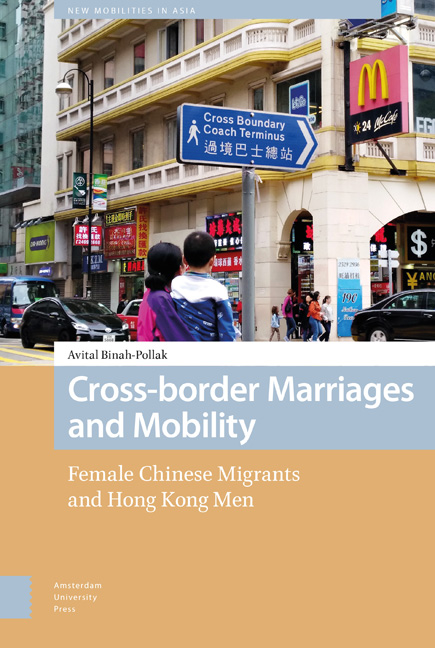Book contents
- Frontmatter
- Contents
- List of Figures and Tables
- Acknowledgments
- Introduction
- 1 The Hong Kong-China Border: A Space of Confinement and Movement
- 2 Motivations for Crossing Borders
- 3 ‘Same as Before, Living as a House Wife’
- 4 Hong Kong's Education: A Bridge to the ‘First World’
- 5 New Voices in Hong Kong: Local Identity Formation
- Concluding Thoughts: Home Is not where the Heart Is but where it Wants to Be
- Bibliography
- Index
3 - ‘Same as Before, Living as a House Wife’
Published online by Cambridge University Press: 21 November 2020
- Frontmatter
- Contents
- List of Figures and Tables
- Acknowledgments
- Introduction
- 1 The Hong Kong-China Border: A Space of Confinement and Movement
- 2 Motivations for Crossing Borders
- 3 ‘Same as Before, Living as a House Wife’
- 4 Hong Kong's Education: A Bridge to the ‘First World’
- 5 New Voices in Hong Kong: Local Identity Formation
- Concluding Thoughts: Home Is not where the Heart Is but where it Wants to Be
- Bibliography
- Index
Summary
The women I came to know in Sheung Shui left their homes in their late teens in search for ‘a better life’. They were young, and they envisioned the city as a destination which could fulfil their dreams. Although they did not acquire institutional mobility in the city, many of the young female migrants still reported having feelings of personal freedom since they were living as single women in dormitories, made their own living, and were able to delay marriage. Their marriage to a man from Hong Kong enabled the women to gain Hong Kong citizenship and acquire the social benefits they lacked as rural migrants. However, their marriage also changed their social position, and their feeling of personal freedom transformed once again. To understand these changes, in this chapter I focus on the gender relations that have constructed, maintained, and transformed the marriages.
The pattern of gender relations that I have identified reveals a ‘gender contract’ between Sheung Shui marriage migrants and their Hong Kong spouses. Following Hirdman's analysis, in this chapter I discuss the three levels in which the gender contract functions: the metaphysical, structural, and individual (1991: 78). I begin with the metaphysical level, which includes cultural myths and representations. Then I discuss the structural conditions and emphasize the link between gender, space, and economics. Last, I focus on the individual level and demonstrate how the marriage migrants’ everyday experiences in Hong Kong reflect their changing subjectivities. Since these marriages involve mobility and result from an amalgam of structures (rural China, urban China, and Hong Kong), I have added a geographical dimension, which is highly relevant to the analysis (Valentine, 2007).
In recent years more and more studies have highlighted the importance of affects and emotions for understanding migration and transnational processes (Shaw and Charsley, 2006; Skrbiš, 2008). Geographers have argued that ‘place’ plays an important role in the on-going constitution of identity (Cresswell, 2004). This idea derives from understanding that ‘who we are’ is closely related to multiple connections with people, events, and places (Conradsonn and Mckay, 2007). Since a person's home usually, although not always, represents stability, geographical mobility significantly influences a person's subjectivity.
- Type
- Chapter
- Information
- Cross-border Marriages and MobilityFemale Chinese Migrants and Hong Kong Men, pp. 89 - 114Publisher: Amsterdam University PressPrint publication year: 2019



